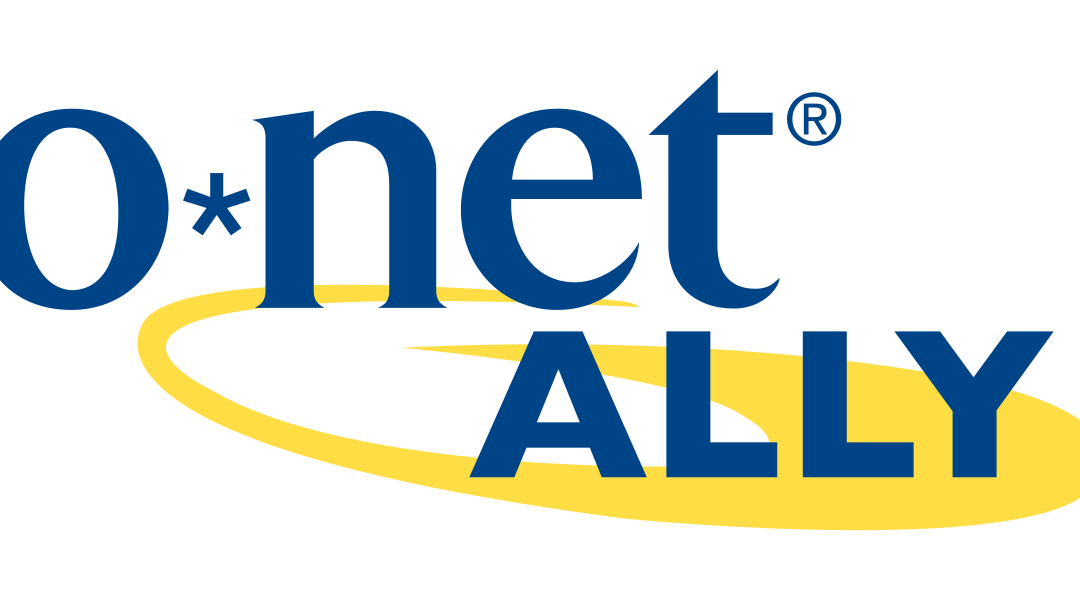
by Mark | Jan 25, 2024 | Employment Issues
Today we are highlighting an area of our work that many of our members might not be aware of – our continued involvement with O*NET. O*NET is a program in the Department of Labor’s Employment and Training Administration. The program is described as a “system maintained by a regularly updated database of occupational characteristics and worker requirements information across the U.S. economy. It describes occupations in terms of the knowledge, skills, and abilities required as well as how the work is performed in terms of tasks, work activities, and other descriptors.”
The O*NET program is the primary source of occupational information in the U.S. The O*NET database serves as the core of the project and includes hundreds of standardized and occupation-specific descriptors of almost 1,000 occupations covering the entire U.S. economy.
The O*NET database is collected and updated through continuous surveys of workers in various occupations supplemented in some cases by occupation experts. O*NET information is used by millions of people each year. Various O*NET applications include O*NET Online, My Next Move, and other publicly and privately developed apps. This data helps workers connect with training and job resources as well as employers looking for skilled workers.
Web Professionals Global helps identify occupational experts (typically our members) who are then surveyed to find out more about their training. We do so under our original name, the World Organization of Webmasters. Let’s look at some of the job descriptions our members have helped define over the years for the U.S. Department of Labor:
Our work on O*NET helps the Department of Labor stay up-to-date on job descriptions, thus allowing it to better serve college graduates and other job seekers.
Visit here for the latest O*NET updates and here for a full list of organizations that assist with data collection for job descriptions.
Get in Touch
Web Professionals Global’s involvement with the O*NET program enables members to help define these jobs so our certifications stay valid and current. If you are a web professional interested in becoming a member, or if you are a teacher or student who thinks our certifications can help your classroom, contact us today.

by Mark | Jan 4, 2024 | Employment Issues, Web Pro Education
In the landscape of Science, Technology, Engineering, and Mathematics (STEM), certifications have emerged as powerful tools that can shape and elevate one’s career trajectory. With the demand for skilled professionals in STEM fields at an all-time high, certifications offer a structured and focused path for individuals to acquire the knowledge, skills, and validation necessary to thrive.
At Web Professionals Global, we are proud to offer an array of professional certifications that prepare secondary, post-secondary and adult learners for future educational and career success. Our certifications are different from those that testing companies offer, which simply prepare students for a test. Our certifications are created and backed by industry professionals and recognized across both the U.S. and the globe. Students earn certifications by working through real concepts and building real-world projects, such as animation designs and video game designs. We also offer “stackable” opportunities in which students can earn multiple certifications with a single discipline (for example, web development) over time to build increasing levels of expertise. We are always happy to chat with teachers, students, and adults who feel like our certifications can help in the classroom or with professional development. For now, let’s look at a few ways in which our certifications are preparing our members for success.
Closing the Skills Gap
The STEM industry is characterized by its rapid pace of innovation and technological advancements. To meet the demands of this ever-evolving landscape, individuals need to continually update and enhance their skill sets. Certifications play a crucial role in addressing the skills gap by providing targeted and up-to-date training that aligns with industry needs.
Certification programs are designed to cover the latest technologies, methodologies, and best practices relevant to specific STEM disciplines. This ensures that individuals are equipped with the most current knowledge and skills demanded by employers, making them valuable assets in a competitive job market.
Specialized Expertise and Niche Proficiency
STEM careers often require specialized expertise in specific areas, and certifications allow individuals to develop niche proficiencies. Whether it’s web design, animation, video game design or mobile app development, certifications provide focused training that goes beyond the broad scope of traditional academic degrees.
These specialized certifications not only validate a person’s expertise but also serve as a clear signal to employers that the individual has invested time and effort to master a particular skill set. This targeted approach enhances an individual’s marketability, making them stand out in a crowded job market where employers increasingly seek candidates with precise, hands-on knowledge.
Industry Recognition and Validation
Certifications serve as tangible evidence of an individual’s competence and proficiency in a specific STEM field. As industry-recognized credentials, certifications carry significant weight with employers seeking to hire skilled professionals. Employers often view certifications as a reliable indicator of practical, real-world skills, which is crucial in a field where hands-on experience is highly valued.
For job seekers, holding relevant certifications like the ones offered by Web Professionals Global can be a differentiator that sets them apart from candidates without such credentials. Whether entering the job market or looking to advance within an organization, certifications provide a clear and standardized measure of one’s capabilities, increasing the likelihood of career success.
Career Advancement and Increased Earning Potential
In the competitive realm of STEM careers, continuous learning and skill development are key factors for career advancement. Certifications offer a structured pathway for professionals to upskill or reskill, positioning themselves for higher-level roles within their organizations.
Additionally, many employers recognize and reward employees who invest in their professional development through certifications. It’s not uncommon for certifications to be linked to salary increases, promotions, or access to more challenging and rewarding projects. The investment in certifications can yield substantial returns, both in terms of career progression and increased earning potential.
Adapting to Emerging Technologies
STEM fields are at the forefront of technological innovation, and staying abreast of emerging technologies is essential for career sustainability. Certifications from Web Professionals Global enable individuals to quickly adapt to new technologies and methodologies, ensuring they remain relevant and valuable in their respective industries.
Whether it’s mastering video game design, learning web development, or becoming proficient in digital animation, certifications offer a streamlined path for individuals to acquire cutting-edge knowledge. This adaptability is crucial in a landscape where technological advancements can reshape industries overnight.
Building a Network and Community
Certifications from Web Professionals Global offer more than just a piece of paper. Our members are part of a rich community of technology professionals from around the world in countries including Italy, Nigeria, Switzerland, Bahrain, the Philippines, and more. This sense of community goes beyond the classroom or online learning platform, providing our members with valuable networking opportunities. Connecting with peers, mentors, and industry experts through certification programs can open doors to collaboration, mentorship, and job opportunities. Networking with other Web Professionals Global members who have similar certifications can lead to insights, job referrals, and a deeper understanding of industry trends and opportunities.
Meeting Industry Standards and Compliance
In certain STEM sectors, adherence to industry standards and compliance is non-negotiable. Certifications often include components that ensure individuals are well-versed in industry standards, regulations, and best practices. This is particularly critical in fields like cybersecurity, where compliance with security standards is paramount.
Certified professionals are not only equipped with the technical skills necessary for their roles but also possess an understanding of the regulatory landscape. This dual competency is highly valued by employers and regulatory bodies, contributing to a professional’s effectiveness and the overall integrity of their work.
Conclusion
In the dynamic and competitive landscape of STEM careers, certifications emerge as powerful catalysts for success. They bridge the skills gap, provide specialized expertise, offer industry recognition, enable career advancement, increase earning potential, facilitate adaptability to emerging technologies, build professional networks, and ensure adherence to industry standards. Reach out to us today to hear more about our certification programs and how you can join our ranks at Web Professionals Global.

by Mark | Nov 29, 2023 | Employment Issues, Industry News
In recent years, we have frequently discussed the rise of remote and hybrid work. As a global organization, we aim to keep members and readers updated on trends happening around the globe that affect the world of the web. Today, we are highlighting a recent development in the United Kingdom that will likely impact how people work not only in the UK but globally as well.
In a November 22 policy announcement, the UK government said that individuals grappling with mobility and mental health challenges may soon find themselves compelled to work from home or risk losing vital benefits under the “Chance to Work Guarantee.” This program, introduced by the Department for Work and Pensions (DWP), is aimed at removing barriers to work for millions of people currently out of work. As part of the plan the DWP will also provide targeted help as part of its £2.5B ($3.1B) Back to Work Plan, including through an expanded program that places people into jobs and provides support to give the best chance of success in a role.
UK Prime Minister Rishi Sunak describes this effort as encouraging people to fulfill “their duty,” as he deemed the current welfare system “unsustainable.” Under the proposed changes, hundreds of thousands of disabled people could face a reduction in benefits of £4,680 (approximately $5,910) annually unless they actively seek remote employment.
In the past few years, the number of people working remotely in the UK has risen significantly. 40% of workers reported working from home in the winter of 2023, compared to 12% in the winter of 2019. Over 20% of 8 million online job ads between April and October 2023 were remote or flexible, up from less than 4% in 2016.
Although it is too early to tell exactly what impact this new policy will have, it is clear that in the coming months and years more people in the UK will need to be equipped with the skills and tools to work remotely. It is also likely that other countries will soon follow the UK and implement their own policies that encourage those on benefits to seek employment from their homes.
Even if you are not disabled, learning how to successfully work on a remote and hybrid basis is extremely valuable. The landscape for work is constantly shifting, and many companies are still utilizing remote work policies that were implemented during the COVID-19 pandemic.
Web Professionals Global offers the Certified Remote Working Professional (CRWP) course and certification to help those transitioning to the world of remote (and hybrid) work. This comprehensive program not only equips you with the skills to become an expert remote worker, but also empowers you to stand out from your peers in the competitive job market. The bonus Interview Preparation and Freelancer Preparation modules are designed to teach you remote and in-person interview skills as well as how to work as a freelancer or independent contractor.
At the end of the course, you will have earned your Remote and Hybrid Working Certification from Web Professionals Global. This globally-recognized certification was created by industry professionals who have worked remotely and on a hybrid basis for many decades, ensuring that your newfound skills receive recognition on a global scale.
For more information on our Certified Remote Working Professional (CRWP) course and certification, or to chat with us about our work, contact us today at membership@webprofessionalsglobal.org.

by Mark | Nov 5, 2023 | Employment Issues
In today’s rapidly evolving job market, the significance of workforce development boards in facilitating the growth and success of adult learners cannot be overstated. With technological advancements and changing industry demands, the need for continuous skill development has become paramount. Workforce development boards have emerged as instrumental platforms, fostering opportunities for adult learners to acquire new skills, enhance existing ones, and ultimately thrive in an increasingly competitive professional landscape.
Web Professionals Global works alongside local workforce development boards (LWDBs) in communities across the country by providing certification opportunities to upskill adult learners and prepare them for in-demand and high-paying careers like web design, web animation, web/mobile game development and more. Our members and advisory board have real-world experience in the professional world and our certifications reflect the needs of the world of work that is rapidly changing.
Overview
A workforce development board is a localized entity that operates within a specific region or community and is responsible for overseeing and coordinating various employment and training initiatives. These boards typically collaborate with local businesses, educational institutions, government agencies, and community organizations to address the workforce needs and economic development priorities of the area they serve.
Workforce development boards have been known by many different names over the years. They may be referred to by different names depending on the region, governance structure, or specific focus of the board. Local Workforce Investment Board, Workforce Training Board, Employment and Training Board Economic Development Board, Career Services Board, Job Training Partnership Board, and Workforce Partnership or Alliance.
These boards operate under the guidance of the Workforce Innovation and Opportunity Act (WIOA) in the United States and are key to connecting job seekers with training and employment services. Congress funds these entities with federal grants that are passed to the state Department of Labor who then help establish and coordinate the funding for the regional workforce boards and takored programming they offer.
The primary function of a workforce development board is to identify the current and future skill requirements of local industries and businesses. By conducting thorough analyses of labor market trends and engaging in regular dialogue with employers, these boards can gain valuable insights into the specific skills and qualifications that are in demand within their respective communities. Based on this information, they develop strategic programs aimed at equipping the local workforce with the necessary skills and competencies to meet these demands.
They facilitate partnerships between educational institutions, employers, and community organizations, fostering a collaborative environment that fosters comprehensive learning experiences. These relationships between stakeholders and workforce development boards create robust networks that facilitate the exchange of knowledge, resources, and expertise, ultimately benefiting adult learners seeking to enhance their professional capabilities.
Additionally, workforce development boards offer a range of specialized training programs and workshops tailored to the specific needs of adult learners. These programs not only focus on technical skills but also emphasize the importance of soft skills, such as communication, critical thinking, and adaptability, which are increasingly crucial in the modern workforce. By incorporating a holistic approach to skill development, these boards ensure that adult learners are equipped with a well-rounded skill set that enhances their employability and resilience in a dynamic job market. This is where Web Professionals Global comes in with certification programs that prepare learners for long-term career success.
Importantly, workforce development boards contribute to the overall economic growth of communities by fostering a skilled and adaptable workforce. By nurturing a talent pool equipped with the latest industry-relevant skills, these boards help attract new businesses, promote entrepreneurship, and drive innovation within local economies. Consequently, this leads to increased job opportunities and a sustainable cycle of economic development, benefitting not only individual learners but also the broader community.
The pivotal role of workforce development boards in empowering adult learners cannot be overlooked. Through their strategic initiatives, these boards not only bridge the gap between education and industry but also promote inclusivity, foster collaboration, and drive economic growth. As the professional landscape continues to evolve, the continued support and development provided by these boards will be essential in ensuring the resilience and success of adult learners in the workforce.
Reach Out to Us Today
Whether you are associated with a workforce development board or just want to learn more about our organization, contact us today to find out how we can work together. Stay tuned to the blog for more on Web Professionals Global’s work with workforce development boards.

by Mark | Oct 2, 2023 | Education, Employment Issues
In recent years, a significant transformation has been underway in the world of employment. The traditional belief that a college degree is an essential prerequisite for many jobs is being challenged like never before. In 2023, we are witnessing a remarkable trend where fewer companies are requiring college degrees when making hiring decisions. This shift is driven by various factors, including a changing job market, evolving workforce demographics, and a growing emphasis on skills and competencies. At Web Professionals Global, we see firsthand how non-degree programs like our certifications help professionals develop their skills and grow in their careers. Let’s dive into some of the factors that have led to this shift:
The Changing Face of the Job Market
One of the key drivers behind the decline in the insistence on college degrees is the evolving job market. As technology continues to reshape industries and create new roles, the demand for specific skills and competencies often takes precedence over formal education. Many of the fastest-growing job sectors for web professionals, such as technology, data science, and digital marketing, value practical skills and hands-on experience over traditional degrees.
The Rise of Skills-Based Hiring
Companies are increasingly recognizing that skills-based hiring can yield more suitable candidates for specific roles. Instead of relying solely on academic qualifications, employers are focusing on assessing candidates’ abilities and competencies directly related to the job. This approach allows companies to identify candidates who possess the skills necessary to excel in their roles from day one.
The Impact of Skills Shortages
Skills shortages in various industries have compelled companies to reconsider their hiring criteria. Many sectors in which web professionals work have seen demand for qualified workers exceed the available supply. To bridge these gaps, employers are becoming more open to candidates with relevant skills, certifications, or vocational training, even if they lack a traditional degree.
Remote Work and Globalization
The rise of remote work and globalization has made it easier for companies to tap into talent pools worldwide. This shift has forced organizations to reevaluate the importance of degrees when hiring remote workers. In a global talent market, companies are prioritizing skills, experience, and the ability to work effectively in virtual teams over traditional academic credentials.
The Changing Attitude of Millennials and Gen Z
Millennials and Gen Z workers, who now make up a significant portion of the workforce, have different perspectives on education and employment. Many of them question the value of accumulating student debt to earn a degree, especially when alternative learning paths and online certifications like those from Web Professionals Global are readily available. Companies are adapting to this generational shift by focusing on what candidates can bring to the table, regardless of their formal education.
Success Stories Without Degrees
Numerous high-profile success stories of individuals (including many Web Professionals Global members) who achieved remarkable career success without college degrees are inspiring both job seekers and employers. These stories highlight that talent, dedication, and a willingness to learn can often trump formal education. Companies are increasingly willing to take a chance on unconventional candidates who can demonstrate their potential and abilities.
2023 marks a pivotal year in the evolution of hiring practices. The decreasing emphasis on college degrees signals a broader recognition of the changing dynamics in the job market. Companies are looking beyond academic credentials to identify the talent, skills, and potential that candidates bring to the table. This shift not only benefits job seekers from diverse backgrounds but also allows companies to access a broader and more talented pool of candidates, ultimately driving innovation and success in an ever-changing business landscape.
Work With Us
If you are a student, young professional or experienced professional, certifications from Web Professionals Global can help you advance in your career. Take advantage of the shifting employment landscape and begin learning in-demand skills today that will help you in the global marketplace.

by Mark | Jun 15, 2023 | Employment Issues, Web Design, Web Development
In tough economic times, some industries rise while others fall. Industries that make money or help others make money seem to always fare better than others. We have heard how the tech industry has been laying off large numbers of employees and contractors. You can argue much of this is COVID-19 fallout, with companies still fearing a potential recession.
The headcount at Twitter has been reduced by 70% in the past year. Facebook laid off about 13% of employees in 2022, and will probably lay off another 12% in 2023. Other tech companies that have recently reduced workforce numbers include LinkedIn, Amazon, Apple, Netflix, Microsoft, Yahoo, Zoom, Salesforce and more.
However, these figures are just one side of the equation. Looking at the U.S. Bureau of Labor statistics for May, we can see that U.S. tech occupations across the economy increased, and the unemployment rate decreased slightly from 2.1% to 2.0%. The current national average unemployment rate across all occupations is 3.7%. This means that even with big cuts in the large tech companies, we are seeing great resilience in the tech job market as a whole. Specifically, web design and development jobs are as strong as ever.
What Do the Numbers Say?
With all the economic turmoil in the tech sector, is entering a career in web design and development a good idea? Let’s look at the numbers. Overall, employment of web developers and digital designers is projected to grow 23 percent from 2021 to 2031, which is a much faster rate than the average for all occupations. It is estimated that there will be 21,800 openings for web developers and digital designers annually over the next decade. A large portion of these openings will be to replace retiring designers and developers.
So, why is web design and other tech careers growing even in the times of layoffs? Web design and development is key to how companies make money. Every company needs to get its product story to market, which is where the web designers and developers come in. Web design is key to how a company makes money.
Think about it: who are the creative people managing the search engine optimization (SEO) that drives connections with the customers? Who creates the engaging content, graphics and sites that deliver the product story that gets people to buy? The answer is web developers and designers who help to execute marketing in a way that makes a company successful.
What Can I Do With Web Design and Development Skills?
Although many people think of the tech world when it comes to web designers and developers, they are in high demand in virtually all industries including healthcare, energy, manufacturing, telecommunications, financial services, and retail. Put simply, any company or organization that needs to reach a target audience and maintain an online presence must have designers and developers. Those with web design and development skills can work in many different areas including programming, cybersecurity, database management, AI and robotics, graphic design, information security, user experience (UX) and others.
The good news is that a career in web design and development does not require a traditional four-year degree. You can earn certifications, like the ones we offer here at Web Professionals Global, that will demonstrate your skills and set you apart when it comes to proving yourself in the professional working world. If you have a certification (or multiple certifications) and a portfolio of projects you have created, hiring managers will be eager to talk with you because they know you would be starting with them ready to hit the ground running on day one. Plus, many designers and developers work on their own with a variety of different clients and act as their own bosses.
Why is it Important to Be Part of a Community of Professionals?
If you are considering becoming a web design or development professional, take advantage of becoming part of the largest community of web professionals in Web Professionals Global. Our mission is “Community, Education and Certifications,” and we help promote the advancement of all professionals in internet-based careers. We have special programming and certifications for web educators and teachers, and we work with teachers who want help or direction from a local or regional professional as well as independent and remote designers and developers who need advice running their own business. Web Professionals Global really is the one-stop shop for those in internet-based careers at any level.
Start Your Career Today
Whether you are a teacher looking for web design and development certifications for your students, or you are an adult seeking to transition into a new career, we can help. Reach out to us today to learn how Web Professionals Global can assist you in advancing your career.






